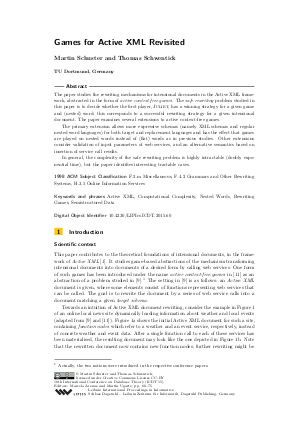Games for Active XML Revisited
Authors Martin Schuster, Thomas Schwentick
-
Part of:
Volume:
18th International Conference on Database Theory (ICDT 2015)
Part of: Series: Leibniz International Proceedings in Informatics (LIPIcs)
Part of: Conference: International Conference on Database Theory (ICDT) - License:
 Creative Commons Attribution 3.0 Unported license
Creative Commons Attribution 3.0 Unported license
- Publication Date: 2015-03-19
File

PDF
LIPIcs.ICDT.2015.60.pdf
- Filesize: 0.5 MB
- 16 pages
Document Identifiers
Subject Classification
Keywords
- Active XML
- Computational Complexity
- Nested Words
- Rewriting Games
- Semistructured Data
Metrics
- Access Statistics
-
Total Accesses (updated on a weekly basis)
0Document
0Metadata
Abstract
The paper studies the rewriting mechanisms for intensional documents in the Active XML framework, abstracted in the form of active context-free games. The safe rewriting problem studied in this paper is to decide whether the first player, Juliet, has a winning strategy for a given game and (nested) word; this corresponds to a successful rewriting strategy for a given intensional document. The paper examines several extensions to active context-free games. The primary extension allows more expressive schemas (namely XML schemas and regular nested word languages) for both target and replacement languages and has the effect that games are played on nested words instead of (flat) words as in previous studies. Other extensions consider validation of input parameters of web services, and an alternative semantics based on insertion of service call results. In general, the complexity of the safe rewriting problem is highly intractable (doubly exponential time), but the paper identifies interesting tractable cases.
Cite As Get BibTex
Martin Schuster and Thomas Schwentick. Games for Active XML Revisited. In 18th International Conference on Database Theory (ICDT 2015). Leibniz International Proceedings in Informatics (LIPIcs), Volume 31, pp. 60-75, Schloss Dagstuhl – Leibniz-Zentrum für Informatik (2015)
https://doi.org/10.4230/LIPIcs.ICDT.2015.60
BibTex
@InProceedings{schuster_et_al:LIPIcs.ICDT.2015.60,
author = {Schuster, Martin and Schwentick, Thomas},
title = {{Games for Active XML Revisited}},
booktitle = {18th International Conference on Database Theory (ICDT 2015)},
pages = {60--75},
series = {Leibniz International Proceedings in Informatics (LIPIcs)},
ISBN = {978-3-939897-79-8},
ISSN = {1868-8969},
year = {2015},
volume = {31},
editor = {Arenas, Marcelo and Ugarte, Mart{\'\i}n},
publisher = {Schloss Dagstuhl -- Leibniz-Zentrum f{\"u}r Informatik},
address = {Dagstuhl, Germany},
URL = {https://drops.dagstuhl.de/entities/document/10.4230/LIPIcs.ICDT.2015.60},
URN = {urn:nbn:de:0030-drops-49773},
doi = {10.4230/LIPIcs.ICDT.2015.60},
annote = {Keywords: Active XML, Computational Complexity, Nested Words, Rewriting Games, Semistructured Data}
}
Author Details
References
-
Serge Abiteboul, Omar Benjelloun, and Tova Milo. The Active XML project: an overview. VLDB J., 17(5):1019-1040, 2008.

-
Serge Abiteboul, Tova Milo, and Omar Benjelloun. Regular rewriting of active XML and unambiguity. In PODS, pages 295-303, 2005.

-
Rajeev Alur and P. Madhusudan. Adding nesting structure to words. J. ACM, 56(3), 2009.

-
Henrik Björklund, Martin Schuster, Thomas Schwentick, and Joscha Kulbatzki. On optimum left-to-right strategies for active context-free games. In Joint 2013 EDBT/ICDT Conferences, ICDT '13 Proceedings, Genoa, Italy, March 18-22, 2013, pages 105-116, 2013.

-
Laura Bozzelli. Alternating automata and a temporal fixpoint calculus for visibly pushdown languages. In CONCUR- Concurrency Theory, 18th International Conference, pages 476-491, 2007.

-
E. Grädel, W. Thomas, and T. Wilke, editors. Automata, Logics, and Infinite Games. A Guide to Current Research. Springer, 2002.

-
Lukasz Kaiser. Synthesis for structure rewriting systems. In Rastislav Královic and Damian Niwinski, editors, MFCS, volume 5734 of Lecture Notes in Computer Science, pages 415-426. Springer, 2009.

-
Wim Martens, Frank Neven, Thomas Schwentick, and Geert Jan Bex. Expressiveness and complexity of XML schema. ACM Trans. Database Syst., 31(3):770-813, 2006.

-
Tova Milo, Serge Abiteboul, Bernd Amann, Omar Benjelloun, and Frederic Dang Ngoc. Exchanging intensional XML data. ACM Trans. Database Syst., 30(1):1-40, 2005.

-
Makoto Murata, Dongwon Lee, Murali Mani, and Kohsuke Kawaguchi. Taxonomy of XML schema languages using formal language theory. ACM Trans. Internet Techn., 5(4):660-704, 2005.

-
Anca Muscholl, Thomas Schwentick, and Luc Segoufin. Active context-free games. Theory Comput. Syst., 39(1):237-276, 2006.

- Martin Schuster and Thomas Schwentick. Games for Active XML revisited. CoRR, abs/1412.5910, 2014. Available online at URL: http://arxiv.org/abs/1412.5910.
-
Johannes Waldmann. Rewrite games. In Sophie Tison, editor, RTA, volume 2378 of Lecture Notes in Computer Science, pages 144-158. Springer, 2002.

